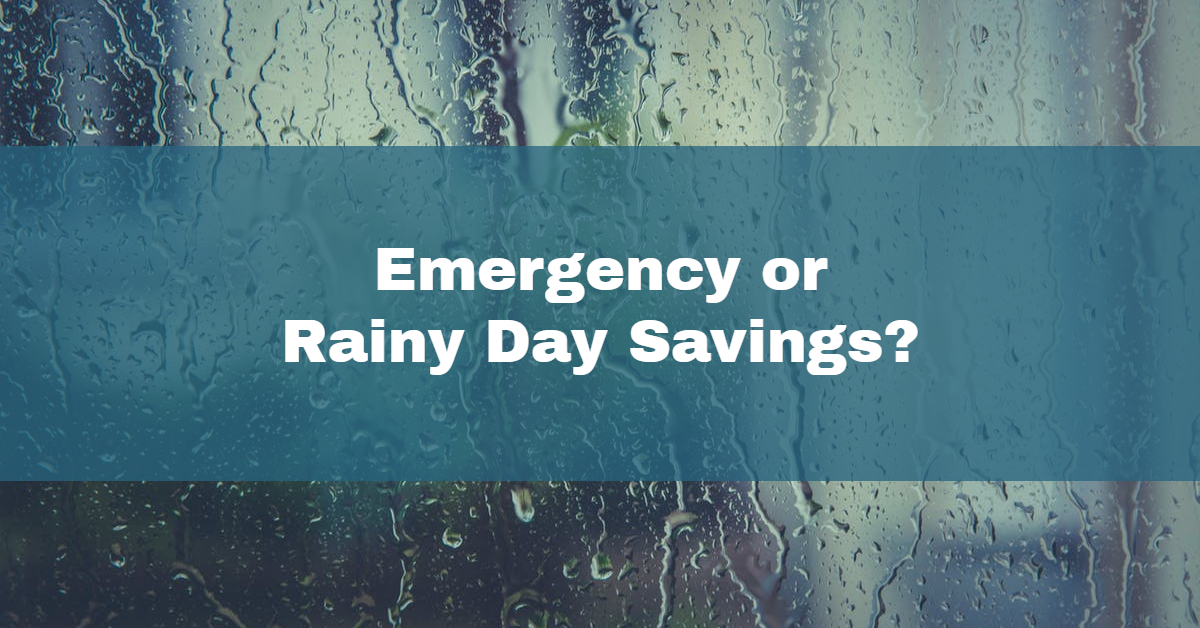Do You Need an Emergency Fund AND Rainy Day Savings?

Surprise! - An unexpected expense has popped up out of nowhere. You may have gotten a flat tire. Your home has suffered water damage and needs to be repaired. Or maybe you're facing an illness that has put you out of work. These are things no one wants to plan for, but everyone should!
Unfortunately, a recent Federal Reserve Board report found 44% of adults would have to sell something or borrow money to pay for an emergency costing $400 or more. For many, one small emergency could tip the scales into debt.
To protect yourself and your loved ones from these issues, we encourage all of our clients to have a Rainy Day Fund as well as Emergency Savings. Here's why you should have both...
Emergency Savings
Emergency savings should be enough to keep you and your family afloat for three to six months in the event of a major life event like job loss, divorce, or medical expenses. We hope you'll never need this, but if you do, this money will stop an emergency from turning into a disaster.
Rainy Day Fund
A rainy day fund is a set aside for smaller financial hiccups, like car repairs, home maintenance, and routine health expenses. Smaller emergencies are almost inevitable - life happens! - and should not force you to dip into your emergency savings.
Here's how to build both funds, no matter how much money you have now.
Convince yourself that it's important.
It's so easy to skimp on saving when life's "what ifs" seem unlikely to happen to you. So help yourself visualize the unexpected, and what it could mean for your family. Make a mental list of possible and probable expenses that aren't part of your month-to-month expenses: braces for your kids, veterinary bills, car repairs, home repairs. Do these things feel more real now?
Make a SMART goal.
Now you need to make a plan. How much do you need in each fund? How will you achieve it? Make a SMART (specific, measurable, achievable, realistic, time-based) goal for building both funds. Example: "I will have $1,000 saved in my Rainy Day account by March of next year. I will add $50 to my Emergency Fund each pay period."
Hack your habits.
Think about what makes you tick, and how you can use that to your advantage. Are you competitive? Challenge your spouse to see who can save more in a month. Are you a visual person? Use a planner like this one to see your progress. For more suggestions, see our easy ways to save more money.
Use the right tools.
In an emergency, quick and easy access to your savings is vital. That means a CD or investment account might not be the best place for your emergency funds. SSB offers multiple savings products with no extra fees, like the Preferred Money Market Savings account or the Passbook savings, all of which give you interest on your accounts. That makes building your funds even faster and easier!
Don't steal from yourself.
These funds are for emergencies only. Do not dip into them for a meal out, a weekend away, or something you can't afford. Your future self will thank you.
Find a way to put money into these accounts consistently, even if it's only a few dollars at a time. In an emergency – big or small – you'll be able to rest easy, knowing you have the funds to handle it.
We want to see all of our clients thrive, so we're more than happy to help you on your way to financial success!
Stop in or contact us online if you have any questions about building your financial future.

